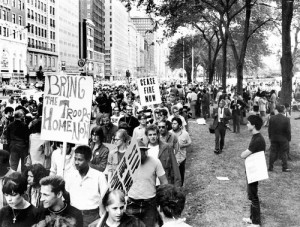
Bernie Sanders, a senator from Vermont, is zeroing in on the “inevitable” Hillary Clinton.
Bernie Sanders is surging. In the first primary in Iowa, he came from far behind to virtually tie with Hillary Clinton. In New Hampshire he beat her in a 22-point landslide. He’s been getting more exposure than ever. Yet Sanders’s prospects for the Democratic nomination remain in heavy doubt. And with that, so too are dimming the Democrats’ prospects for winning the White House in November.
Despite voters’ clear preference in the earliest primaries, the delegate count – which is what ultimately determines the nomination – is in Clinton’s favor. Super delegates are turning the tide for her so far. These are party officials who are free to nominate whoever they choose at the convention, rather than being bound by primary voters. Not surprisingly, most who have declared have lined up with the establishment to support Clinton, who is now beating Sanders in super delegates as much as 355-14.
If Sanders wins the popular vote but Hillary wins the nomination it will be a disaster. There is precedent for the party establishment bucking its progressive base. At the tumultuous 1968 Democratic National Convention, actually the catalyst for the current primary system that bound most delegates to voter will, activists were adamant that establishment candidate Hubert Humphrey not win the nomination. But he did, and a deflated Democratic base allowed Richard Nixon to become the president.
It’s debatable whether super delegates would buck any overwhelming consensus from Democratic voters with the lesson of 1968 in mind. But even as Sanders surges in polls – including catching up to Clinton in the next primary state of Nevada – the Democratic establishment continues to divide the party by seemingly being intent on nominating Clinton.
A number of progressive voters are already disgusted with the party for its corruption and treatment of Sanders. The limited debate schedule was seen as a slight against candidates who needed exposure. The DNC temporarily revoked Sanders’s access to an important voter registry. And just this week the party reversed a decision from President Obama and allowed PACs and lobbyists to donate directly to the DNC, likely giving PAC-friendly Clinton a financial boost.

Antiwar protesters at the 1968 convention demanded change and an antiwar candidate. The DNC didn’t give it to them and Richard Nixon became the president.
The Democratic Party is begging for a rebellion from within its own ranks. Only this time if the party is fractured it won’t be Nixon going into the White House. It will be Donald Trump.
Like Sanders, Trump has been rebuffed by much of his party’s establishment. Unlike the DNC, however, the GOP seems to be coming around to Trump. In fairness, Trump’s lock on the GOP nomination is strong; Sanders and Clinton remain in a fierce contest. But in terms of general election strategy, Sanders is the better candidate to beat Trump.
Even if Clinton wins the nomination cleanly plenty of voters will be turned off by the party’s previous shenanigans. Hopefully enough will recognize the danger of Trump and turn out to vote against him, but many may stay home. And although the general election is still pretty far away, polling actually shows Sanders doing better than Clinton against Trump.
Most damningly of all, many undecided voters like only two candidates: Bernie Sanders and Donald Trump. Neil Levesque, executive director of the New Hampshire Institute of Politics, made this discovery interviewing a roomful of undeclared voters. Levesque asked why two candidates with completely different positions would be voters’ first and second choice. They told him, “Because they’re not the same old thing, they’re going to break up the system, they’re outsiders – we’re sick of the same old political stuff.”
In a race against Clinton, Trump would likely attract a great number of these undecided voters. Bizarrely, the silver-spooned billionaire candidate of the party that represents the 1 percent would be seen as the anti-establishment outsider – even against the first female candidate.
Sanders, meanwhile, has driven his campaign by railing against billionaires to the point where his phrasing of the word has become a go-to for impressionists. Both he and Trump speak their opinions honestly, but only Sanders lays out any specific agenda. Only he has any measurable politics. And most of America backs Sanders’s progressive initiatives. Compared to a real outsider candidate offering popular solutions, a blustery buffoon like Trump wouldn’t stand a chance.
Republicans will have a united front going into the general election. Their establishment won’t sabotage Trump’s presidential bid. Progressives may get behind Clinton, but her campaign doesn’t inspire the same enthusiasm that Sanders does in this year of the outsider. The Democratic establishment is wrong to try to temper their base’s enthusiasm by questioning Sanders’s electability and writing off his goals as unattainable. Not only is Sanders electable and his policies popular, he’s America’s best chance at preventing a Trump presidency.

You forgot to mention those of us that will write in Bernie Sanders. The DNC thinks they can get away with their bad behavior and try to hold our votes hostage with the threat of a Republican president. It will not work. Clinten should back out of the running because her shady campaigning and the obvious cheating by the DNC is breaking up the Democratic party. Sanders not only has the young and the independent s in his corner but some Republican s are switching sides.
LikeLike